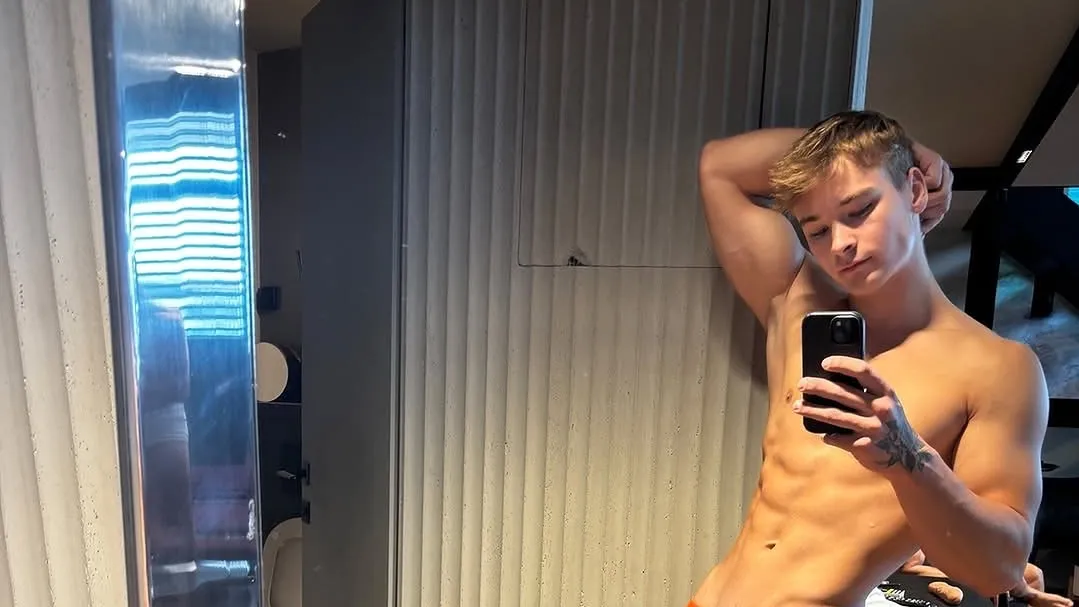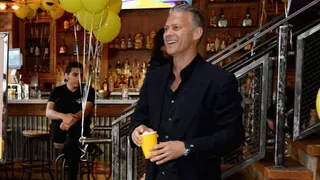November 16, 2013
Out There :: To Monsignor with Love
Kilian Melloy READ TIME: 4 MIN.
The 2014 edition of the Orthodox Calendar is quite up-to-date, paying tribute as it does to marriage equality. The calendar-makers call their work inspired by "the story of young gay couples from Eastern Europe sharing a common dream of one day being able to wed their beloved at the altar of St. Basil's or St. Sophia's, or any other Eastern rite church. In celebration of the fact that love, regardless of sexual orientation, exists and can be celebrated everywhere and by everyone, we bring you a fantastic selection of artistic pictures." But really, no excuse is necessary.
"Starting today, anyone can discover our 12 seductive artistic pictures of Orthodox priests and their guests by ordering from our store at www.orthodox-calendar.com. The price for the classic wall calendar is only Euro 16.99, and you can buy our limited edition calendar with an uncensored cover for only Euro 29!" Surely defrocked priests are a steal at twice the price. The comely calendar models are our kind of religious icon.
Skating Away
Last Wednesday we started our day bright and early by attending the Icebreaking ceremony at this year's Holiday Ice Rink in Union Square. Skating in the heart of the cosmopolitan Square continues daily, 10 a.m.-11:30 p.m., until Jan. 20, 2014. It costs $11 for skate rental (tickets available at the rink ticket window, or online at unionsquareicerink.com).
The rink will be the venue for this year's installment of "Drag Queens on Ice: An Eleganza Extravaganza" presented by Visit Mendocino County, coming up on Thurs., Dec. 12, at 8 p.m. A rink publicist told us of a perfect moment last year when she saw a squadron of drag queens descend upon Union Square from the West as the San Francisco Bulls hockey club approached from the East. "It was so San Francisco!" We whole-heartedly agreed.
Then we headed to the W San Francisco for a press lunch welcoming new Executive Chef Jason Rea to Trace restaurant. Rea's cuisine is prepared from locally sourced and sustainable ingredients - so local, in fact, that our yellowtail crudo was studded with flowers from the W's rooftop garden upstairs. The uni mixed with pasta was sourced from Fort Bragg. Fresh veggies came from the city's wealth of farmers' markets. And - this was a new one - the roasted beet salad was sweetened by honey "from our bees" who reside on the hotel roof.
The chef brought over a few of their honeycombs for us to compare, explaining that honey from each comb tastes different because "the bees are sourcing it from different pollens, from different plants and flowers." This is a new frontier: delegating the sourcing of ingredients to the producing animals themselves - who presumably don't have culinary degrees, but learned the ropes from being on the job. Delicious work all around, bees.
Back in Print
American gay author Christopher Coe published two novels before his early death of AIDS in 1987. Now the first of these, "I Look Divine" (1987), long out of print, is being republished by Bruno Gmuender Verlag. Really more of a character study than an episodic story, the novel describes the life of Nicholas, a supreme narcissist, as his brother collects his things following his untimely death in New York City.
Nicholas' natural habitat was found in grand hotel bars in capital cities and resorts around the world. His favorite place was right in front of a mirror. "The mirrors make me wonder how Nicholas felt when he looked at himself," his unnamed brother muses. "I wonder if Nicholas really believed that cheekbones have bad days."
He was a creature of his society. We see him in an underground bar in Rome, "a place where men could dance together, and most of the men were dancing, but not together. There were no pairs; there were mirrors. There were mirrors on walls, on columns, and the most beautiful men in Rome were dancing alone, each one by himself, entranced with himself."
We see Nicholas getting along in this self-regarding world by taking in "what he referred to as his chess winnings. For about 10 years, until the end of his 20s, Nicholas referred to the cigarette cases, the clothes, the paintings, all that he was given by men, as his winnings.
" 'Look at my new frock,' my brother would say, his voice up an octave with delight. 'Look at my new bibelot.' Gimcrack. Cadeau. Objet pas exactement trouve."
It's a frivolous, glamorous world that comes alive in this tale, even if it's ultimately tragic. Its style harkens back to pre-AIDS gay literature, to Williams and Capote, and even further back, as novelist David Leavitt notes in his introduction, to Ronald Firbank and Wilde. Still, "though AIDS is never mentioned in 'I Look Divine,' its specter haunts the novel." It's a miniature masterpiece brought back from the dead.
Kilian Melloy serves as EDGE Media Network's Associate Arts Editor and Staff Contributor. His professional memberships include the National Lesbian & Gay Journalists Association, the Boston Online Film Critics Association, The Gay and Lesbian Entertainment Critics Association, and the Boston Theater Critics Association's Elliot Norton Awards Committee.







